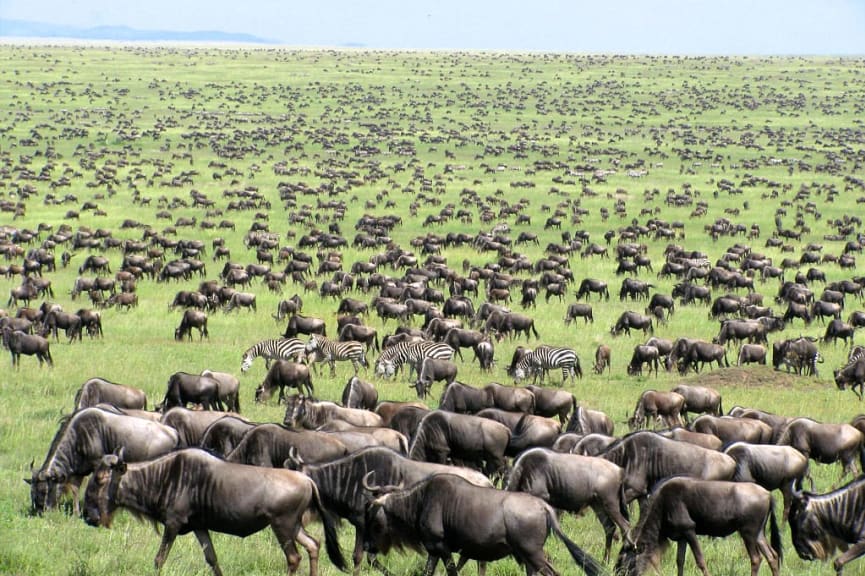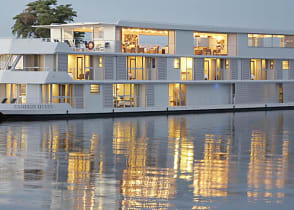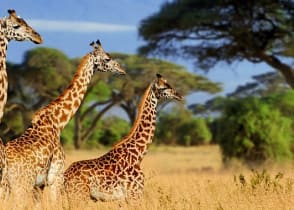7 Things That Affect the Cost of an African Safari

Ol Pejeta Conservancy, Kenya
How much does an African safari cost is an important question as you consider embarking on one of the world's greatest adventures. With this in mind, we have compiled a list of several components that play a role in determining the overall cost.
Understanding your priorities allows you to maximize your budget and creating your customized adventure with a safari expert will ensure you gain the most from this truly remarkable adventure.
From when to safari to where to go, the following information will guide you on which factors impact cost as you prioritize what is ideal for your journey.
1. Your Safari Priorities

The Great Migration of wildebeests and zebras in Tanzania
Each safari destination presents something slightly different and determining your priorities will ensure you gain the most from your experience, while keeping within your budget.
Certain game reserves and safari parks offer a malaria-free experience and perhaps this is most important to you. A fascination with elephants may steer you to safari regions abundant with great herds, your dream may be to witness the Great Migration on Great Migration safaris, or a private game-drive vehicle may be a priority.
From fly-in safaris to a multi-destination experience, what an African safari costs depends on knowing what you hope to gain from your experience.
Learn more: Types of African Safaris: Different Ways to Experience a Safari
2. East Africa vs Southern Africa

Londozoli Private Reserve in South Africa. Photo courtesy of Londozoli
With an extensive number of safari regions, parks, and reserves, Southern and East Africa offer impressive quality and luxury experiences, and choosing between the two comes down to a few key differences.
Southern Africa safaris lead the way in modern luxury safaris, with premier destinations and private concessions combining perfectly with city and beach escapes. East Africa safaris combine a high density of wildlife and classic safari experiences focused on private or group adventures.
When it comes to African safari prices, currency may play a part. Southern Africa prices in South African rands (ZAR), while US dollars are used in East African destinations. In both regions, safaris can take place in one or more destinations, and moving from one place to the next is a key factor in costs.
Learn more: How to Choose a Safari Destination for Your Trip
3. Your Chosen Safari Season

Ngorongoro Conservation Area, Tanzania
While embarking on an African safari is enjoyable throughout the year, there are months and seasons in which game viewing is optimal, so picking your safari by season will have an effect on costs.
Each safari season offers a unique side to the African bush. Low season is during the heavy rainfall months between March and early May, while the green season falls between November and February.
For visitors looking for the ultimate safari experience, the dry, winter months from June to August are prime game-viewing times, with July and August peak months. During this time, demand can drive prices up.
Learn more: Best Time to Go on an African Safari
4. National Parks vs Private Concessions or Game Reserves

Selinda Reserve, Botswana
Both government-managed national parks and privately-owned game reserves and concessions adhere to similar principles of management regarding wildlife conservation.
Guests who choose private options tend to have a few more liberties. With fewer visitors, the experience is exclusive, with the option to go off-road on Africa's Big 5 safaris, as well as walking safaris or night drives, all of which enhance game experiences.
Staying in a private concession or private game reserve comes with a higher price tag, as extremely qualified guides show you through nature in intimate style and luxury.
Learn more: What’s the Difference Between National Parks, Conservancies, Private Concessions, and Private Game Reserves?
5. Accommodation Options

Mombo Camp in the Okavango Delta, Botswana
Your accommodation options can make a significant difference to the overall cost of your African safari, with choices ranging from hotel-style lodges to humble bush chalets and luxury canvas tents.
The variety of accommodations available across the safari landscape varies from park to park, reserve to reserve, with properties offering rooms and suites, each commanding prices that depend on inclusions and exclusions.
Mobile camping leaves less of a footprint in the wilderness, facilities are still comfortable and stylish, but there are fewer than permanent luxury tents. Larger lodges boast an array of activities and this is generally a less-exclusive option.
Learn more: Types of Safari Accommodations and How to Choose
6. Guide-Only Safaris vs Guide & Tracker Safaris

Kruger National Park, South Africa. Photo Courtesy South Africa Tourism
A key element of any safari is the game drives. Some lodges and camps may have you under the care of a sole guide, a member of the team who knows the bush and wildlife habits well, while other properties invite you to experience the dynamic partnership between a guide and his tracker.
Most trackers have grown up in the region in which they work and know the lay of the land and its inhabitants. Their incredible knowledge of reading spoors on the ground and their eagle eyes spotting any movement around them is priceless and can enhance any safari adventure.
Depending on which guided experience you have on your safari will determine the amount you will want to tip. With guidelines in place, guides command more, sometimes double, than trackers. However, the value you put on your experience is up to you.
7. Additional Safari Cost Considerations

Sundowners in South Luanga National Park, Zambia
While your safari package will include all meals and, at some lodges and camps, local beverages, many parks and reserves contain accommodations that offer more than a standard safari package, which can affect the cost of an African safari. Morning tea and afternoon snacks are part of your day on safari. However, those extra beverages or favorite cocktails may come at a cost.
Some properties include afternoon game-drive beverages, while others may add those to your bill. Many include extras such as walking safaris or wildlife talks, but where night drives are possible, a charge may be incurred. You may be swept up at the thought of taking a hot-air balloon ride in lieu of an early-morning game drive, a truly spectacular experience at an additional cost. Whether taking a safari with children or looking for an adventurous romantic getaway, the style of African safari you want could change the overall cost. Our tips to plan a family African safari and most romantic places in Africa for honeymoon offer different ways you can explore and experience the right trip for you and your budget.
Tipping on safari is customary, with set guidelines in place to help visitors plan. However, these are also discretionary and you may feel you wish to tip more in some circumstances. General housekeeping tips are appreciated and there is a chance you may feel the calm of the wilderness luring you into a spa treatment, with the African bush as your background.
Learn more: How to Plan an African Safari: Frequently Asked Questions
Plan Your Ideal African Safari

Mokoro boat safari at Sanctuary Baines Camp in Bostwana
There are many destinations worldwide that may bring out your inner travel planner. However, when considering an African safari adventure, the guidance of an expert is highly recommended. Creating your unique safari experience takes planning and knowledge, especially when finding the right fit for your budget and needs.
Consider all aspects involved in planning an African safari by checking out our African safaris for inspiration. Then, speak to one of our safari experts to start creating your adventure. They can help translate your goals with their understanding of Africa’s safari regions, lodges, camps, and activities. You can also find ideas on when to go, the wildlife you can see, and more with our African safari travel guide.
Life-Enriching Travel Designed Just for You
- 1
Trips curated by the world’s top destination experts
- 2
Concierge-level service leading up to and during your trip
- 3
Unique, exclusive experiences and insider access

